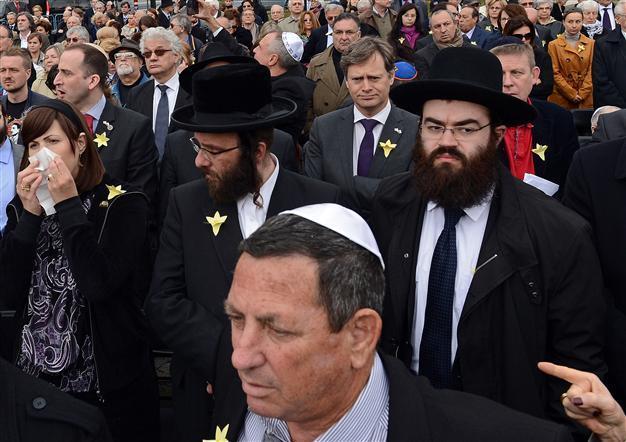Warsaw marks 70 years since uprising in ghetto
WARSAW - The Associated Press

People stand in front of the Warsaw Ghetto Uprising monument during festivities to mark the 70th anniversary of the Warsaw Ghetto Uprising in Warsaw on April 19, 2013. AFP photo
Sirens wailed and church bells tolled in Warsaw as largely Roman Catholic Poland paid homage Friday to the Jewish fighters who rose up 70 years ago against German Nazi forces in the Warsaw ghetto uprising.
The mournful sounds marked the start of state ceremonies that were led by Polish President Bronislaw Komorowski at the iconic Monument to the Ghetto Heroes. The president was joined by officials from Poland, Israel and beyond as well as a survivor of the fighting, Simha Rotem, to honor the first large-scale rebellion against the Germans during World War II.
About 750 Jews with few arms and no military training attacked a much larger and well-equipped German force that was about to send the remaining residents of the ghetto to death camps. The revolt was crushed the following month, and the ghetto was razed to the ground, most of its residents killed.
"We knew that the end would be the same for everyone. The thought of waging an uprising was dictated by our determination. We wanted to choose the kind of death we would die,"said Rotem, an 88-year-old who is among a tiny number of surviving fighters and was the key figure at the ceremony. "But to this day I have doubts as to whether we had the right to carry out the uprising and shorten the lives of people by a day, a week, or two weeks. No one gave us that right and I have to live with my doubts."
Rotem's uncertainty is in stark contrast to how the world remembers the revolt. Though a clear military defeat, it is hailed as a moral victory for the Jewish fighters, who refused to go without a fight to the gas chambers. It is widely viewed as a model of resistance against the odds and is often celebrated in Israel, part of a never-again ethos that stresses the importance of self-defense.
"The Nazi Germans made a hell on earth of the ghetto," Komorowski said in a speech. "Persecuting the Jews appealed to the lowest of human instincts."
During the ceremonies, Komorowski bestowed one of the country's highest honors on Rotem - the Grand Cross of the Order of the Rebirth of Poland. Later the two of them, along with Israeli Education Minister Shai Piron and Wladyslaw Bartoszewski, a Polish Auschwitz survivor who helped rescue Jews during the war, walked side-by-side to the monument and bowed before it as soldiers laid a wreath for them.
To a military drum, other dignitaries followed them in paying their respects at the memorial to suffering and struggle, including Polish Prime Minister Donald Tusk, members of Poland's Jewish community and U.S. Ambassador Stephen Mull along with an American survivor of the Warsaw ghetto, Estelle Laughlin.
Rabbis also recited mournful Hebrew prayers as they were joined by three Polish army chaplains, one Catholic, one Eastern Orthodox and one Protestant. Psalm 130, which starts, "Out of the depths I cry to you, O Lord! ..." was recited in Hebrew and Polish.
Officials had announced that a second surviving fighter, Havka Folman Raban, would also participate, but she was not featured in television coverage and it was unclear if she actually was there.
Throughout Warsaw, national and city flags fluttered from city buses, trams and public buildings as authorities made an unprecedented effort to encourage Poles to remember the ghetto fighters and Jewish suffering during the war. Warsaw city hall said it is the first time that churches in the capital rang their bells to mark the anniversary of the uprising.
Though the Warsaw ghetto uprising is well-known worldwide, it hasn't received the same level of attention among Poles, for whom a separate city-wide revolt in 1944 plays a much more critical role to national identity.
Authorities, however, have been trying to change this and to convince Poles that the Warsaw ghetto uprising is a key moment not just in Jewish but also in broader Polish history.
Newspaper articles in recent days have stressed the Polishness of the Jewish revolt, while officials have encouraged Warsaw residents to get involved in a month of commemorations that ends on May 16. That is the day in 1943 when the Nazis blew up the Great Synagogue, a jewel of 19th-century architecture, to symbolize their crushing of the revolt.
The events Friday followed an evening of commemorations on Thursday featuring the Israel Philharmonic Orchestra.
Israel also marked the anniversary of the uprising on its Holocaust Remembrance Day, April 7, which coincided with the Hebrew date of the anniversary of the Warsaw ghetto uprising.
